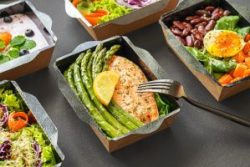What is your Metabolism?
What is your metabolism and how does it work?
We often hear the word “metabolism” but what does it really mean? Metabolism is all the chemical processes that occur in our cells to keep us alive. These processes include synthesizing (making) proteins, breaking down food to release energy, and replicating DNA.
Our metabolism is constantly working to maintain a balance between two opposing states: anabolic and catabolic. Anabolic processes build things up, such as synthesizing proteins from amino acids or storing glucose as glycogen in our muscles. Catabolic processes break things down, such as when we digest food to release energy or when we break down glycogen to use as fuel. The goal of our metabolism is to maintain a healthy balance between these two states.
Basal Metabolic Rate (BMR)
Our BMR is the amount of energy (measured in calories) that our body expends at rest in order to maintain vital functions like breathing, circulating blood, and controlling body temperature. Roughly 60-75% of the calories we burn each day go towards our BMR.
The number of calories we burn at rest is determined by many factors including our age, weight, gender, muscle mass, and genetics. As we age, our BMR slows down because we tend to lose muscle mass and our metabolic rate decreases by about 2% per decade after the age of 20. This is why it’s harder to lose weight as we get older!
Resting Metabolic Rate (RMR)
RMR is very similar to BMR but it includes the energy expended from digesting food. RMR makes up about 10-15% of the calories we burn each day.
The thermic effect of food (TEF) is the amount of energy required to digest, absorb, and process the nutrients in the food we eat. TEF varies depending on the macronutrients (fat, protein, carbohydrates) in the meal but typically protein has the highest TEF (20-35%) followed by carbohydrates (5-15%) and fat (0-5%).
Non-Exercise Activity Thermogenesis (NEAT)
NEAT refers to all the calories burned from activities that are not sleeping, eating or exercising. This can include activities like walking around your office or doing chores around your house. NEAT can account for up to 50% of the calories you burn each day!
Conclusion:
Now that you know more about metabolism, you can understand how important it is to keep your metabolism healthy and functioning properly. There are many factors that contribute to a healthy metabolism including diet, exercise, sleep, and stress levels. By paying attention to these factors, you can ensure that your metabolism stays healthy and working properly!
Physiques Gym has a team of coaches, online or in person, who will work with you to create a plan that helps you reach your goals and keep the weight off for good. What are you waiting for? Schedule an assessment to start changing your habits today!
Online Training Consultation In Person Consultation




